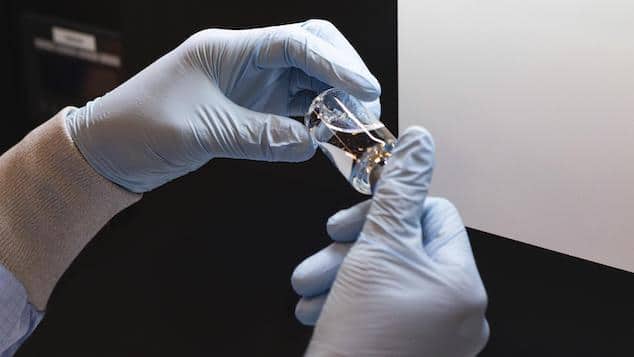
Remdesivir experimental drug by Gilead is approved by FDA for emergency use in coronavirus patients as COVID-19 pandemic continues to cause havoc on public health and world economy.
The Food Drug Administration (FDA) has approved the emergency use of the experimental drug remdesivir on emergency coronavirus patients. Use of the drug manufactured by Gilead Science appears to help drastically afflicted individuals recover sooner.
To date is the first drug shown to help fight Covid-19, which has killed more than 240,000 people worldwide, with 66K deaths in the US alone.
According to a White House press release on Friday, the drug would be available for patients hospitalized with Covid-19.
The emergency approval comes days after Dr Anthony Fauci, the US top infectious disease expert, expressed cautious optimism about the results of a remdesivir drug trial.
‘The data shows that remdesivir has a clear-cut, significant, positive effect in diminishing the time to recovery,’ Fauci said earlier this week. ‘What it has proven is that a drug can block this virus.’
New standard of care for severely ill Covid-19 patients:
The FDA’s approval follows preliminary results from a government-sponsored study showing Gilead Sciences’s remdesivir shortened the time to recovery by 31%, or about four days on average, for hospitalized Covid-19 patients.
The study of 1,063 patients is the largest and most strict test of the drug and included a comparison group that received just usual care so remdesivir’s effects could be rigorously evaluated.
Those given the drug were able to leave the hospital in 11 days on average versus 15 days for the comparison group. The drug also might be reducing deaths, although that’s not certain from the partial results revealed so far.
Fauci said the drug would become a new standard of care for severely ill Covid-19 patients like those in this study. The drug has not been tested on people with milder illness, and currently is given through an IV in a hospital.
It remained unclear how the drug would be absorbed by individuals with less critical symptoms and what complications could potentially arise.
Remdesivir is an experimental compound that was tested as a potential Ebola treatment in 2014. Now, it’s undergoing clinical trials to see if it’s safe and effective against the coronavirus in people.
But scientists say it’s too soon to know. https://t.co/pEMNH17yGz
— NPR (@NPR) March 21, 2020
The FDA cutting corners in a bid to respond to catastrophic public health crises:
As the coronavirus continues to cause economic and public health havoc, President Trump has been under increasing pressure to help bring about a possible vaccine released to the public as the pandemic continues to drag on.
The FDA, utilizing its emergency powers under a public health crises chose to authorized the drug and to date limit its use in serious life or death patients.
In normal times the FDA requires ‘substantial evidence’ of a drug’s safety and effectiveness, usually through one or more large, rigorously controlled patient studies. But during public health emergencies the agency can waive those standards, simply requiring that an experimental drug’s potential benefits outweigh its risks.
No drugs are approved now for treating the coronavirus, and remdesivir will still need formal approval. The FDA can convert the drug’s status to full approval if Gilead or other researchers provide additional data of remdesivir’s safety and effectiveness.
Use of the drug will be authorized for adults or children who are hospitalized with suspected or confirmed Covid-19 and whose condition is ‘severe’, meaning they have low blood oxygen levels, need oxygen therapy or are on a mechanical ventilator, the FDA said.
‘Based on evaluation of the emergency use authorization criteria and the scientific evidence available, it was determined that it is reasonable to believe that remdesivir may be effective in treating Covid-19, and that, given there are no adequate, approved or available alternative treatments, the known and potential benefits to treat this serious or life-threatening virus currently outweigh the known and potential risks of the drug’s use,’ the FDA said in its statement.
Why did @GileadSciences change their Remdesivir metric mid-study, from being a study to prevent death, to measuring time to recovery? In clinical studies this is a big no-no. (As discussed on #IngrahamAngle, death rate improvement was only 11.6 to 8 percent).
— Laura Ingraham (@IngrahamAngle) May 1, 2020
Side effects and safety?
The emergency use authorization (EUA) also includes information about possible side effects, which include ‘increased levels of liver enzymes, which may be a sign of inflammation or damage to cells in the liver; and infusion-related reactions, which may include low blood pressure, nausea, vomiting, sweating and shivering’. It also notes that there may be other serious side effects that have not been discovered yet.
The EUA requires hospitals to monitor patients’ liver enzymes through blood tests before the treatment is started and every day that treatment is ongoing.
Patients who receive the drug will be provided with a fact sheet, which is available here. The drug is administered through an IV once a day for up to 10 days.
Then, why is @POTUS approving it? This makes no sense. Have we been duped? #remdesivir #covid19 pic.twitter.com/1sbEfAtKJB
— ⭐️⭐️⭐️#Q #WWG1WGA⭐️⭐️⭐️ (@HugaWendy) May 2, 2020






